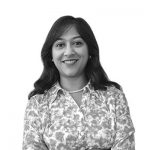In our first-ever Women in Media discussion, senior panellists argued that women have the ability to turn around a business by bringing fresh and innovative perspectives to traditional modes of thinking.
One of the factors driving the agendas of the ASBU Broadcast Pro Summit over the last nine years has been a commitment to unravelling some of the abiding industry challenges, and there’s surely no clearer place to start than with the role of women as decision-makers and champions. So one of the core panels of the 2019 Summit, Women Executives – Breaking the Mould, set about looking at the trailblazers and their experiences – the positives, the enduring inertia and the potentially better ways forward.
In her introductory statement, moderator Tracey Grant, Viacom Vice President for Content & Channels Middle East, pointed out a few facts. The model of leadership is predominantly male in most industries, with Forbes announcing that the number of female CEOs on the Forbes 500 list has risen to 6.6%. She asked how each woman on the panel got to her current leadership role, and what it would take for more women to get there and to move on to board positions.
When the question of why diversity is needed was raised, Amanda Turnbull, VP and Country Manager for Middle East and Africa at Discovery Communications, highlighted how diversity is fundamental to innovation and growth within any business.
“Diversity drives different thinking. Different thinking drives innovation. Innovation drives a competitive advantage. Thus, diversity should be a priority for business,” she said, adding that the broadcast industry is challenged in so many different ways today that “having the ability to think differently is absolutely critical” to its survival.
As someone who leads Discovery across MENA, Turnbull proudly pointed out that 50% of the company’s workforce in the region is female and many of the senior management are women, including her boss.
“At Discovery, this concept of diversity is baked into our DNA, because we can’t serve global audiences or tell global stories across any screen unless we are thinking in a diverse way. I have worked for more than 30 years now outside the UK and I have been here for six years, in APAC for 17 years, working across Hong Kong, China, Taipei, Singapore and Korea, and I have worked in Eastern Europe and Russia. For me, it’s about creating a positive workplace for everybody and having that flexibility, respect and work-life balance.”
Maysoun Odeh Gangat, co-founder and Managing Director at Nisaa Broadcasting Radio Company, took the discussion forward by pointing out that one of the reasons she founded Nisaa FM was so society could see that “women are producers of media content and not just consumers… when I established Nisaa FM, the whole idea was to empower women in media and through media”.
She highlighted the many societal constraints women working in the media face in Palestinian and Arab society, “like working late nights as journalists, not having a safe environment to work in, encountering harassment and unequal pay, as well as poor conditions for maternity leave”. If a woman gets pregnant, “it hinders her from reaching top posts, even becoming a CEO or having senior roles”.
She also pointed out that media plays a very important role in changing a society’s mindset, and this is what Nisaa has helped to do over the ten years since it was established.
Taking the equal opportunity agenda further, Nomad co-founder Zoe Griffiths said her company already has a balanced workplace environment, with a 50-50 ratio, and in a few weeks, the production house’s current hiring would tip the balance in favour of women.
“Our ethos is around storytelling, and diversity is important to create content. It’s more about the talent and who has the ideas. You need a diverse range of people within your company, both men and women from different backgrounds and different nationalities, to be able to create content to feed audiences over a wide range,” she pointed out. “We are also creating content to reach a wider audience, not just women or just men. For us, building a team is about creating the best minds, and diversity is important to help us create that variety of content.”
For Gangat, a diverse team is synonymous with economic growth. She believes that when the other 50% of the population is involved, “one can aspire to have an economy that is dynamic”.
Zahra Zayat, Vice President, MENA at YuppTV, agreed, adding that “when companies bring women on board in executive roles, they show that they value diversity of experience and that leads to the growth of the company and better numbers”.
Of course, creating that balance between personal and professional life does not come easy for most women. Zayat, who hails from Lebanon, says women there “are still fighting for their rights” and have been criticised for trying to have a better life.
Noha Jadallah, Content and Editorial Manager at OSN, said that while she agrees with having both men and women in the industry, the model is somewhat different for this region.
“Regionally, I have felt a difference. While the industry everywhere does have this demanding always-on culture, keeping a good work-life balance is much more difficult here. I used to feel self-conscious for leaving the office on time. If you are not able to finish your work on time, I have always believed that you are either inefficient or under-resourced. Middle East society tends to be much more forgiving of men sacrificing time with family for work.”
Jadallah said that women need to be empowered in the broadcast industry today so that they can be an inspiration for the next generation. She pointed out that with the Saudi market opening up and the first large-scale number of women joining the workforce, if they are empowered, they will serve as a huge inspiration for generations to come.
Speaking about inspiration, Zayat pointed out that she was fortunate to have had a female mentor early on in her life, who continuously supported her through her youth and played a significant role in her success today.
Grant took this opportunity to state that the ratio of women to men studying in universities in the GCC is 60:40, but sadly that isn’t translating into the workspace.
“Education is not the challenge here; it seems to be the lack of opportunity. Stepping into the workplace and the step up the ladder seem to be the missing part. How do we counter that and is this where mentors come in?” she asked.
The panellists all agreed that mentors or older people had played a crucial role in helping them through their career, and some added that it was critical for women to support each other.
“I have been super lucky to have had both men and women support me through my career. I think to a certain extent, you have to go out and find them. You’re in charge of your own career,” commented Turnbull.
Griffiths commented that there are some great role female models in the UAE media, which inspires more women to aspire to reach those heights.
Jadallah, who grew up in New Zealand, said she was also fortunate to have a lot of role models: “After all, New Zealand was the first country in the world where women gained the right to vote. When I was growing up, we had Helen Clark as Prime Minister and now of course, we have Jacinda Ardern – the youngest person to hold office in New Zealand, who also gave birth during her term and even breastfed her baby in parliament. I was also very lucky to have worked with a number of amazing women in senior roles, who I looked up to and admired.”
Amanda Turnbull added that women are not being given much opportunity to take on manager-level positions, and there are even fewer women at higher levels to promote. “It is really crucial how leaders model their behaviour. It is not a glass ceiling [in the media industry; rather, it is a broken rung at the bottom of the ladder.”
Clarifying that statement, Turnbull said more support must be given to women with the functional expertise to rise to managerial positions.
“It’s that time that you lose a lot of women to having families, and that ties into all this because you need flexible working hours. Everybody in this room can do something to support those women. You can mentor and sponsor so they are at least getting onto the ladder,” she advised.
But she also added that things are changing.
“If you look at the statistics in the UAE, in 1990 there were 29% women in the workforce. Today, it’s 42-43%. So you can see that things are changing. The question is how to speed it up.”
Maysoun Gangat elaborated: “Media is an important tool to breaking this ceiling and allowing women to move up to senior positions. When we started the radio station, it was all about social impact and that is why the content of the radio station is inspirational. To bring about social change, the media serves a huge role in changing mindsets within the community. Content helps to raise issues and challenge some taboos inside society.”
On the topic of content, Jadallah stated that in general, media is more consumed by women and therefore it was common to see more women in content roles but cautioned that with the changing landscape, women have to develop technical skills as well. “It’s very important that we get more involved with setting out requirements that support how our content is being curated and displayed. The industry is changing, but our point of view is still key, and we must learn how to feed our views to the algorithms of tomorrow.”
The panellists unanimously agreed that as leaders in their field, they have often literally been the only woman in the room. Zahra Zayat cited an instance at a large event last February in Kuwait, when she went on stage to announce a new product only to discover that she was the only woman there.
Turnbull said that during her career, she has been in the same situation many times.
“I am often in a position where I am the only woman in the room. I have to make it clear to people in the room that I’m not a note-taker, I’m not making the tea, I’m not the party planner, and most certainly not the mother. You just have to operate – be consistent, positive and clearly respectful, but you have to make that point.”
Grant concluded the discussion with one final query, asking if the question of diversity would tip things in favour of a woman when hiring talent.
Turnbull commented that “talent comes first… You need the diversity and certainly ensuring that you have balanced female representation on a shortlist is a good first step. But if you have the talent, Discovery will champion you and bring you the opportunity, irrespective of age or gender.”
Gangat stated that with Nisaa’s aim being to create jobs for women, the company’s agenda is to hire women if it can, though she admitted that she often has to hire men to take on technical roles, for want of female applicants.
Jadallah pointed out that some of the world’s best athletes would not be where they are today “if they were not plucked out of their environment, given the support and tools they needed to excel by those in positions of power”.
Zayat commented that it was very important to rotate people on boards and not allow anyone to occupy a board seat for too long. “Enforcing turnover on board seats will help facilitate new blood and diversity. Women should have larger representation on boards.”
Griffiths added: “If you have talent, we will push you forward and develop you. We are about moving people forward and empowering them to become managers, and we see over the years that all the management team who are coming under the partners are mainly women and are the decision-makers. They are managing the projects and are the creative force behind that content as well.”



















































































